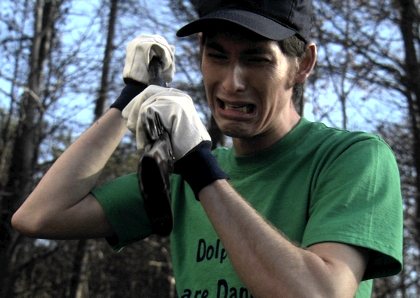Primary navigation


Anton Bitel hails a belatedly released satire of American car culture surely destined for cult status
“It’s the future – like, two weeks from now,” deadpans a suited government agent direct to camera in Blood Car’s opening scene, eating crisps like a cinemagoer as he introduces “a story about a man… about his invention… about society… about you.”
So, with this flagrant breach of both chronological logic and the fourth wall, Blood Car immediately establishes its absurdist tone. Alex Orr’s feature debut was in fact completed in 2007, winning acclaim and awards at various festivals before going straight to DVD in the US – but in the half decade that it’s taken to get its theatrical release in the UK, the film has left its influence on Quentin Dupieux’s left-field ‘road movie’ Rubber and Dean Francis’s more conventional highway horror Road Train (both 2010), the former similarly featuring a killer car part, the latter a carnivorous engine.
The idea of a blood-fuelled vehicle can be traced back to Ferat Vampire (1982, featuring Dagmar Veskrnová, future wife of Czech president Václav Havel, in a nude role), but Orr, co-writing with Adam Pinney, inventively uses this trope to satirise the ethical, social, ecological and geopolitical exhaust left by America’s all-consuming love affair with the car, that great symbol of status and mobility, in a world increasingly running on empty. If ‘two weeks from now’ has since become ‘several years ago’, and Blood Car’s specific barbs at the Bush administration’s willingness to engage in war and ‘patriotic’ murder over its dwindling oil supply have lost some of their sting, there is still ongoing relevance in the film’s allegorical commentary on America’s addiction to a lifestyle fuelled by precious, limited and destructive resources.

When vegan kindergarten teacher and amateur inventor Archie Andrews (Mike Brune) discovers that his prototype engine requires human blood to work, he is quick to abandon his every principle to keep the motor ticking over so that his auto-obsessed, man-eating new girlfriend Denise (Katie Rowlett) will continue fuelling his own carnal desires. The result is a mordant, raunchy and at times gory trip into the dark heart of the American Dream, as everyman Archie’s drive to stay on the road becomes a Faustian pact, with the price for his full tank being others’ lives and his own soul.
Making the most of his low budget and fully embracing a B-picture sensibility, Orr loads his film with broad caricatures, low humour and hilariously surreal (and politically incorrect) digressions. But this is an exploitation movie about exploitation, and its disarming goofiness and transgressive vulgarity eventually give way to images of state execution and infanticide – all in the name of the American Dream – that are shockingly serious, if still played for uncomfortable laughs. A speech of frankly insane justification delivered by another government agent (Matt Hutchinson) near the film’s end evokes Dr. Strangelove (1964) – and indeed Blood Car is similarly apocalyptic in its lampooning of post-millennial anxieties, with a gleefully cynical finale pointing to a dead-end future for all but a self-serving political elite. A couple more weeks down the road, Blood Car will be a cult classic.
Tarantino bites back: Nick James talks to the director about Death Proof (February 2008)
Death Proof reviewed by Tony Rayns (October 2007)
Syriana reviewed by Ryan Gilbey (April 2006)
Heaven’s mouth: Paul Julian Smith on And Your Mother Too (April 2002)
Pup fiction: Edward Lawrenson on Amores perros (May 2001)
Burn, blast, bomb, cut: J. Hoberman on Three Kings (February 2000)